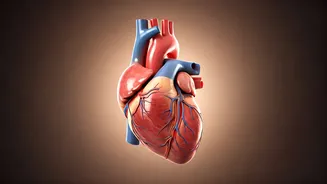Chest Discomfort Explained
The first subtle warning sign identified by the cardiologist is chest discomfort. It's crucial to understand that this discomfort isn't always the classic
crushing chest pain people often associate with heart attacks. Instead, it can manifest as a feeling of pressure, squeezing, fullness, or a mild ache. This discomfort might come and go, or it could persist. Furthermore, it might extend beyond the chest, radiating to other areas like the arms (particularly the left arm), jaw, neck, back, or even the stomach. The nature and location of the pain vary. Any persistent or unusual chest sensation needs immediate medical attention. It's vital to discuss any such symptoms with a healthcare professional to determine if they relate to a heart condition or other medical issues. Ignoring chest discomfort could be dangerous because heart attacks can develop very rapidly, even within hours.
Breathing Difficulties Unpacked
The second subtle sign mentioned by the cardiologist is unusual shortness of breath. This symptom could occur with or without chest discomfort. Someone experiencing a heart attack might find it hard to catch their breath, even when they're at rest. They may feel like they can't get enough air, or they may experience wheezing. It's essential to recognize that this breathing difficulty could be different from what they usually experience during physical activity or stress. This symptom occurs because when the heart isn't working correctly, it struggles to pump blood effectively, which can lead to fluid buildup in the lungs. This buildup makes breathing difficult. Any new, unexplained, or worsening shortness of breath should be promptly evaluated by a doctor. Rapid assessment of heart-related issues can help in early diagnosis and intervention.
Unusual Fatigue Clarified
Extreme fatigue is the third potential warning sign highlighted by the cardiologist. This fatigue goes beyond feeling tired after a long day or a strenuous workout. It involves an overwhelming exhaustion that might appear suddenly. This feeling often occurs for no apparent reason. Individuals undergoing a heart attack might experience this fatigue alongside other symptoms, such as chest discomfort or shortness of breath. The fatigue could be so intense that even simple tasks become challenging to perform. In some cases, the individual might feel as if they lack the energy to do anything. Because fatigue can be associated with various medical conditions, it is crucial to consult a medical professional if this extreme exhaustion presents along with any other symptoms that could indicate a heart condition. Quick diagnosis allows for faster medical help.
Other Potential Indicators
The final warning sign noted by the cardiologist involves a range of symptoms. These can include sweating, nausea, dizziness, lightheadedness, and cold sweats. These symptoms could happen on their own or together. They indicate that the heart might not be efficiently circulating blood to the brain and other parts of the body. Sweating can occur due to the body's response to pain and stress. Nausea and vomiting might be linked to the pain signals reaching the brain. Dizziness or lightheadedness can arise from insufficient blood flow to the brain, and cold sweats reflect the body's stress. If you experience these symptoms, seek immediate medical attention. Quick intervention improves the chances of a favorable outcome. Remember, recognizing these signals can be the first vital step in effectively addressing a possible heart attack, and quick medical intervention can greatly improve the chances of survival.






















